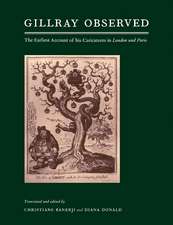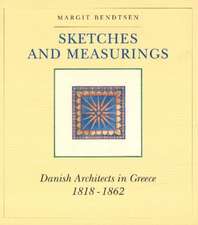Art and Commerce in Late Imperial Russia: The Peredvizhniki, a Partnership of Artists
Autor Dr Andrey Shabanoven Limba Engleză Paperback – 20 mar 2024
| Toate formatele și edițiile | Preț | Express |
|---|---|---|
| Paperback (1) | 192.19 lei 6-8 săpt. | |
| Bloomsbury Publishing – 20 mar 2024 | 192.19 lei 6-8 săpt. | |
| Hardback (1) | 718.60 lei 6-8 săpt. | |
| Bloomsbury Publishing – 9 ian 2019 | 718.60 lei 6-8 săpt. |
Preț: 192.19 lei
Preț vechi: 249.82 lei
-23% Nou
Puncte Express: 288
Preț estimativ în valută:
36.79€ • 37.86$ • 31.01£
36.79€ • 37.86$ • 31.01£
Carte tipărită la comandă
Livrare economică 01-15 martie
Preluare comenzi: 021 569.72.76
Specificații
ISBN-13: 9781350435797
ISBN-10: 1350435791
Pagini: 280
Ilustrații: 59 bw illus
Dimensiuni: 156 x 234 x 25 mm
Greutate: 0.38 kg
Editura: Bloomsbury Publishing
Colecția Bloomsbury Visual Arts
Locul publicării:London, United Kingdom
ISBN-10: 1350435791
Pagini: 280
Ilustrații: 59 bw illus
Dimensiuni: 156 x 234 x 25 mm
Greutate: 0.38 kg
Editura: Bloomsbury Publishing
Colecția Bloomsbury Visual Arts
Locul publicării:London, United Kingdom
Caracteristici
Analyzes the Peredvizhniki as a fundamental phenomenon for understanding Russian art, culture and society of the 19th and 20th centuries
Notă biografică
Andrey Shabanov is a Research Fellow and Lecturer in the Department of Art History at the European University at Saint Petersburg, Russia. He is a contributor to the digital resource Bloomsbury Art Markets.
Cuprins
Acknowledgements ConventionsIntroductionPart One: The Peredvizhniki Represent ThemselvesChapter 1. Commercial institutionalization, 1870-1871Chapter 2. Selling the exhibition, 1871-1897Chapter 3. Self-fashioning in group photographs, 1886-1897 Chapter 4. Revealing the art manifesto, 1888Part Two: The Peredvizhniki in the Eyes of the CriticsChapter 5. Inaugural success: the first show, 1871Chapter 6. Split with the Academy: the fifth exhibition, 1876Chapter 7. Critical point: the eleventh, twelfth, and thirteenth shows, 1883-1885 Chapter 8. Self-Defence: the Partnership's anniversary reports, 1888, 1897Conclusion: The Peredvizhniki in a broader European contextAppendices1. Charter of the Partnership for Touring Art Exhibitions, 18702. The Partnership's fifteenth-anniversary report, 18883. The Partnership's twenty-fifth-anniversary report, 18974. A list of the touring art exhibitions and statistics, 1871-1923 Selected bibliographyIndex
Recenzii
[Where] Shabanov has most succeeded is to demonstrate the diversity of works in the Peredvizhniki exhibitions. This diversity includes such aspects as the types of paintings exhibited as well as the social breadth of models represented in portraiture.
This groundbreaking work greatly advances our understanding of Russian realist painting, the professionalization of artists, and wider processes of cultural identity formation in the nineteenth century. In recovering the original ethos and agenda of the Peredvizhniki, Shabanov provides a vital revisionist account which uncovers the pragmatic and commercial nature of this well-known but long misunderstood artistic group.
In his masterful investigation Andrey Shabanov offers an alternative history of Russian Realist art. Confronting and undermining the stereotypes which have long afflicted studies of the peredvizhniki (owing in small degree to the highly tendentious social interpretations by Soviet scholars), Shabanov places artists such as Kramskoi, Perov, and Repin in the practical context of the "art market" of photographic reproduction, advertising, incorporation, and mass distribution. By providing new and often archival information on the pragmatic, promotional, and commercial aspects of the peredvizhniki, Shabanov furnishes us with a luminous and lucid account of one of Russia's primary artistic attainments.
This groundbreaking work greatly advances our understanding of Russian realist painting, the professionalization of artists, and wider processes of cultural identity formation in the nineteenth century. In recovering the original ethos and agenda of the Peredvizhniki, Shabanov provides a vital revisionist account which uncovers the pragmatic and commercial nature of this well-known but long misunderstood artistic group.
In his masterful investigation Andrey Shabanov offers an alternative history of Russian Realist art. Confronting and undermining the stereotypes which have long afflicted studies of the peredvizhniki (owing in small degree to the highly tendentious social interpretations by Soviet scholars), Shabanov places artists such as Kramskoi, Perov, and Repin in the practical context of the "art market" of photographic reproduction, advertising, incorporation, and mass distribution. By providing new and often archival information on the pragmatic, promotional, and commercial aspects of the peredvizhniki, Shabanov furnishes us with a luminous and lucid account of one of Russia's primary artistic attainments.











